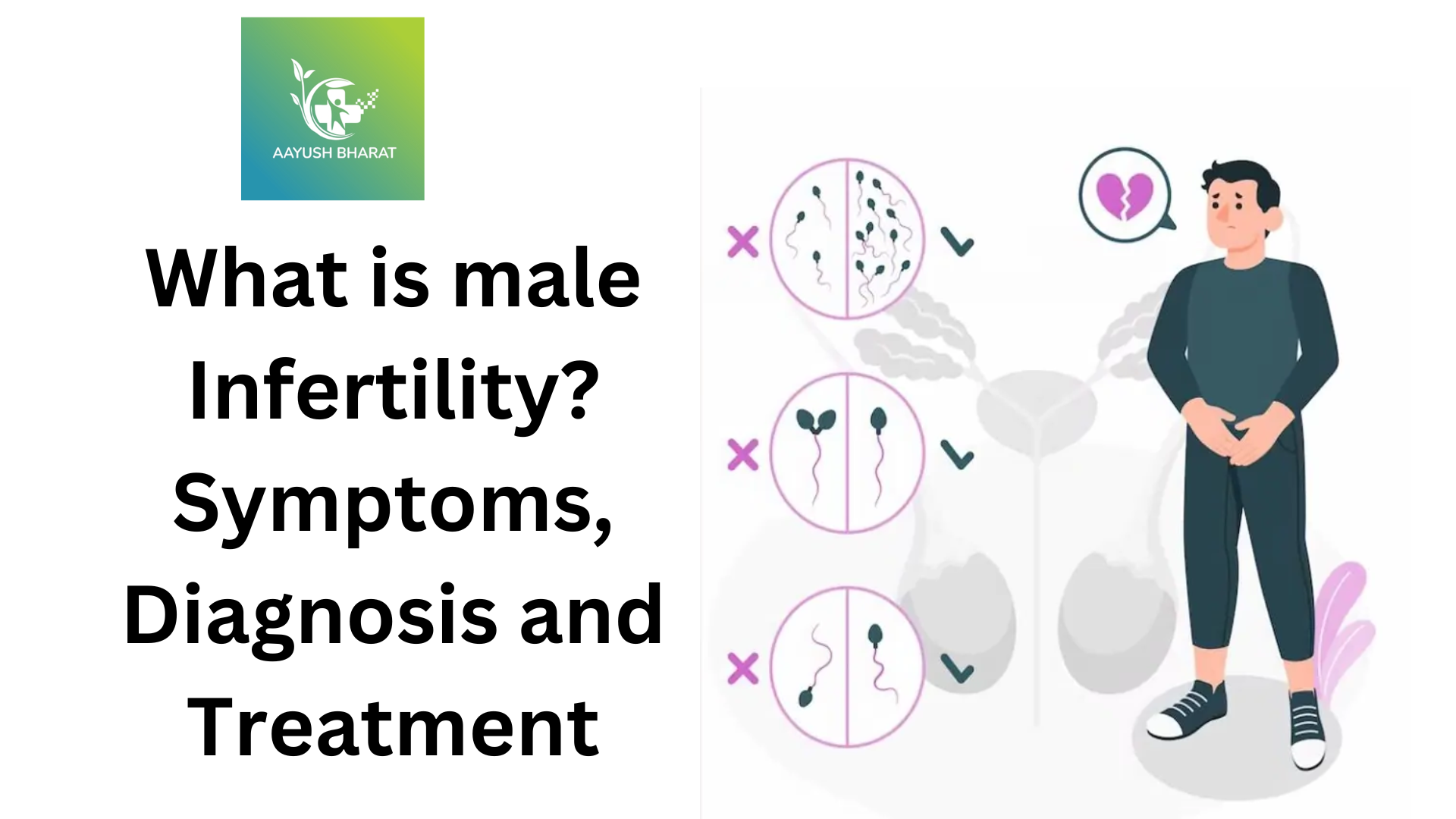Male infertility is a medical condition characterized by a man’s inability to contribute to the conception of a child with a fertile female partner, despite engaging in regular, unprotected sexual intercourse. This condition is typically diagnosed when a couple fails to achieve pregnancy after a specified period, commonly around a year, of consistent attempts.
Male infertility may result from various factors, including abnormalities in sperm count, motility, morphology, hormonal imbalances, structural issues in the reproductive tract, genetic factors, and environmental or lifestyle influences. The diagnosis often involves a comprehensive fertility evaluation, and treatment options may include lifestyle modifications, medication, surgery, or assisted reproductive technologies, depending on the underlying causes identified.
It is a complex and multifaceted issue that becomes apparent when a couple faces challenges in achieving pregnancy despite engaging in regular, unprotected sexual intercourse.

Common causes of male infertility include:
Low Sperm Count (Oligospermia): Having too few sperm in the ejaculate can reduce the chances of fertilizing an egg.
Poor Sperm Motility (Asthenospermia): If sperm have difficulty moving or swimming, they may struggle to reach and fertilize an egg.
Abnormal Sperm Morphology (Teratospermia): Sperm with abnormal shapes may have difficulty penetrating an egg.
Ejaculation Disorders: Conditions such as retrograde ejaculation (semen entering the bladder instead of exiting the penis) can affect fertility.
Buy This Product:-
Varicocele: This is a swelling of the veins that drain the testicle, and it can lead to reduced sperm quality.
Hormonal Imbalances: Disorders that affect the hormones involved in sperm production can contribute to infertility.
Genetic Issues: Inherited disorders, such as Klinefelter syndrome, can cause infertility.
Testicular Damage or Dysfunction: Injury, surgery, or certain medical conditions can harm the testicles and affect sperm production.
Environmental Factors: Exposure to certain toxins, chemicals, and radiation can impact sperm production.
Lifestyle Factors: Smoking, excessive alcohol consumption, drug use, obesity, and stress can negatively influence fertility.
Read More,
What is Sperm? Things you Should Know About Sperm
5 Foods To Avoid When Taking Shilajit
What is testosterone? How can you boost your testesterone level?
What are the Health Benefits of Sex
Ayurvedic Treatment for Infertility: Nurturing Natural Fertility
Symptoms of Male Infertility:
The main sign of male infertility is the inability to conceive a child. There may be no other obvious signs or symptoms.
Buy This Product:- RePro Shudh Shilajit
In some cases, however, an underlying problem such as an inherited disorder, hormonal imbalance, dilated veins around the testicle, or a condition that blocks the passage of sperm causes signs and symptoms. Signs and symptoms you may notice include:
- Problems with sexual function — for example, difficulty with ejaculation or small volumes of fluid ejaculated, reduced sexual desire, or difficulty maintaining an erection (erectile dysfunction)
- Pain, swelling, or a lump in the testicle area
- Recurrent respiratory infections
- Inability to smell
- Abnormal breast growth (gynecomastia)
- Decreased facial or body hair or other signs of a chromosomal or hormonal abnormality
- A lower-than-normal sperm count (fewer than 15 million sperm per milliliter of semen or a total sperm count of less than 39 million per ejaculate)
Diagnosis:-
Many infertile couples have more than one cause of infertility, so it’s likely you will both need to see a doctor. It might take several tests to determine the cause of infertility. In some cases, a cause is never identified.
Infertility tests can be expensive and might not be covered by insurance — find out what your medical plan covers ahead of time.
Diagnosing male infertility problems usually involves:
- General physical examination and medical history:- This includes examining your genitals and asking questions about any inherited conditions, chronic health problems, illnesses, injuries, or surgeries that could affect fertility. Your doctor might also ask about your sexual habits and your sexual development during puberty.
- Semen analysis:- Semen samples can be obtained in a couple of different ways. You can provide a sample by masturbating and ejaculating into a special container at the doctor’s office. Because of religious or cultural beliefs, some men prefer an alternative method of semen collection. In such cases, semen can be collected by using a special condom during intercourse.
Your semen is then sent to a laboratory to measure the number of sperm present and look for any abnormalities in the shape (morphology) and movement (motility) of the sperm. The lab will also check your semen for signs of problems such as infections.
Often sperm counts fluctuate significantly from one specimen to the next. In most cases, several semen analysis tests are done over some time to ensure accurate results. If your sperm analysis is normal, your doctor will likely recommend thorough testing of your female partner before conducting any more male infertility tests.
Your doctor might recommend additional tests to help identify the cause of your infertility. These can include:
- Scrotal ultrasound:- This test uses high-frequency sound waves to produce images inside your body. A scrotal ultrasound can help your doctor see if there is a varicocele or other problems in the testicles and supporting structures.
- Transrectal ultrasound:- A small, lubricated wand is inserted into your rectum. It allows your doctor to check your prostate and look for blockages of the tubes that carry semen.
- Hormone testing:- Hormones produced by the pituitary gland, hypothalamus and testicles play a key role in sexual development and sperm production. Abnormalities in other hormonal or organ systems might also contribute to infertility. A blood test measures the level of testosterone and other hormones.
- Post-ejaculation urinalysis:- Sperm in your urine can indicate your sperm are traveling backward into the bladder instead of out your penis during ejaculation (retrograde ejaculation).
- Genetic tests:- When sperm concentration is extremely low, there could be a genetic cause. A blood test can reveal whether there are subtle changes in the Y chromosome — signs of a genetic abnormality. Genetic testing might be ordered to diagnose various congenital or inherited syndromes.
- Testicular biopsy:- This test involves removing samples from the testicle with a needle. If the results of the testicular biopsy show that sperm production is normal your problem is likely caused by a blockage or another problem with sperm transport.
- Specialized sperm function tests:- Several tests can be used to check how well your sperm survive after ejaculation, how well they can penetrate an egg, and whether there’s any problem attaching to the egg. These tests aren’t often used and usually don’t significantly change treatment recommendations.
Treatment:-
Often, an exact cause of infertility can’t be found. Even if an exact cause isn’t clear, your doctor might be able to recommend treatments or procedures that will lead to conception.
Buy This Product:- Ultra Josh Capsules
In cases of infertility, it’s recommended that the female partner also be checked. There may be specific treatments recommended for your partner. Or, you may learn that proceeding with assisted reproductive techniques is appropriate in your situation.
Treatments for male infertility include:
- Surgery:- For example, a varicocele can often be surgically corrected or an obstructed vas deferens repaired. Prior vasectomies can be reversed. In cases where no sperm are present in the ejaculate, sperm can often be retrieved directly from the testicles or epididymis using sperm retrieval techniques.
- Treating infections. Antibiotic treatment might cure an infection of the reproductive tract, but doesn’t always restore fertility.
- Treatments for sexual intercourse problems:- Medication or counseling can help improve fertility in conditions such as erectile dysfunction or premature ejaculation.
- Hormone treatments and medications:- Your doctor might recommend hormone replacement or medications in cases where infertility is caused by high or low levels of certain hormones or problems with the way the body uses hormones.
- Assisted reproductive technology (ART):- ART treatments involve obtaining sperm through normal ejaculation, surgical extraction or from donor individuals, depending on your specific case and wishes. The sperm are then inserted into the female genital tract, or used to perform in vitro fertilization or intracytoplasmic sperm injection.
When treatment doesn’t work?
In rare cases, male fertility problems can’t be treated, and it’s impossible for a man to father a child. Your doctor might suggest that you and your partner consider using sperm from a donor or adopting a child.
Male infertility care at Aayush Bharat
Our caring team of Aayush Bharat experts can help you with your health concerns. Visit Aayush Bharat to get started.
Get the process started
Bottomline:-
Male infertility is a common issue, affecting a significant number of couples trying to conceive. Fortunately, advancements in medical science have provided various diagnostic and treatment options to address male infertility. These may include lifestyle changes, medication, surgery, or assisted reproductive technologies such as in vitro fertilization (IVF) and intracytoplasmic sperm injection (ICSI).
Buy This Product:- RePro Shudh Ashva Shilajit
It’s crucial for couples struggling with infertility to seek medical advice early in the process. Both partners should undergo a thorough examination to identify any potential issues. Additionally, lifestyle factors such as maintaining a healthy weight, avoiding excessive alcohol and tobacco use, and managing stress can contribute to improved fertility.
Seeking the guidance of a fertility specialist or reproductive endocrinologist can help couples navigate the complexities of infertility and explore appropriate treatment options. The emotional and psychological aspects of infertility should not be overlooked, and couples may benefit from support groups or counseling during this challenging journey.

If you want to Ask anything related to Male Infertility Contact Us or Comment.
Frequently Asked Questions and Answers
- What are the common symptoms of male infertility?
- Symptoms of male infertility may not always be apparent. However, some potential signs include changes in sexual function, pain or swelling in the testicle area, and ejaculation issues. It’s important to note that many cases of male infertility lack noticeable symptoms, making professional evaluation necessary for diagnosis.
- How is male infertility diagnosed?
- Male infertility is diagnosed through a series of tests, including a semen analysis to assess sperm count, motility, and morphology. Hormone tests may be conducted to evaluate levels of testosterone and other key hormones involved in reproductive function. Additionally, imaging studies, genetic testing, and a thorough medical history may be part of the diagnostic process.
- What lifestyle factors contribute to male infertility, and can they be modified?
- Lifestyle factors such as smoking, excessive alcohol consumption, drug use, obesity, and high-stress levels can impact male fertility. Adopting a healthier lifestyle by quitting smoking, moderating alcohol intake, maintaining a balanced diet, exercising regularly, and managing stress can positively influence fertility in some cases.
- What are the treatment options for male infertility?
- Treatment for male infertility depends on the underlying cause. Common interventions include medication to address hormonal imbalances, surgery to correct anatomical issues like varicoceles, and lifestyle changes. In assisted reproductive technologies (ART), such as in vitro fertilization (IVF) or intracytoplasmic sperm injection (ICSI), sperm can be directly injected into an egg to facilitate fertilization.
- When should a couple seek professional help for male infertility?
- If a couple has been actively trying to conceive for a year without success, it’s advisable to seek the guidance of a healthcare professional. However, if there are known risk factors or concerns regarding male fertility, such as a history of reproductive disorders or certain medical treatments, it may be appropriate to seek assistance earlier in the process. Timely intervention can help identify and address potential issues, improving the chances of successful conception.
To consult with a specialist Download the AayushBharat App from Playstore.

0 Comments